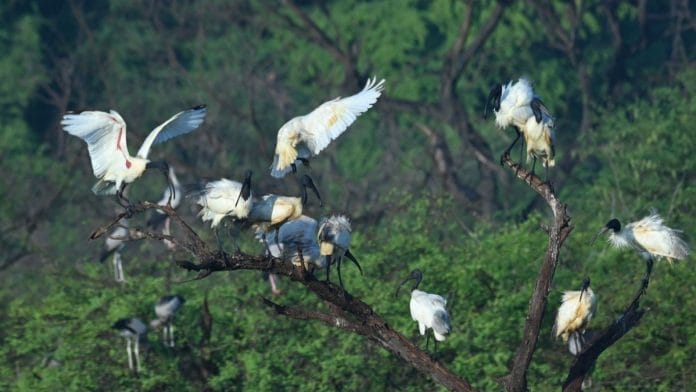Bengaluru: The villagers of Kollukudipatti in Shivagangai district, Tamil Nadu, have celebrated Diwali without bursting crackers for decades. They are mindful of not disturbing the birds in the neighbourhood.
Villagers recall that bursting crackers during festivals disturbed nesting birds; eggs would crack, and sometimes wash away in the water. All that changed five decades ago.
The Vettangudi area, notified as a Sanctuary on 23 June 1977, under the provisions of the Wildlife Protection Act 1972, covers about 36.89 hectares. Though small in size, it is one of Tamil Nadu’s most vibrant wetlands, protected for its rich birdlife and interlinked water bodies—Periyakollukudi Patti tank, Chinnakollukudi Patti tank, and Vettangudi Patti tank—which together form a living, breathing ecosystem.
The sanctuary shelters a remarkable range of avifauna. The Black-headed Ibis and Open-bill Stork are considered its keystone species. Alongside them thrive cormorants, darters, spoonbills, woolly-necked storks, painted storks, egrets, black ibises, grey herons, knob-billed ducks, and whistling ducks. In recent years, even the Chinese Pond Heron has been recorded here—an exciting sign for local bird watchers. The birds nest and roost mainly in the babul trees that fringe the tanks. The sanctuary also supports mongoose, spotted deer, star tortoises, chameleons, parakeets, honey buzzards, and black-shouldered kites.
Also read: Tigers of the skies finally get a govt boost. Tamil Nadu unveils Raptor Research Foundation
Divine birds
What makes this landscape truly special is the relationship between the villagers and their birds. The people of Kollukudipatti believe that bird droppings enrich the tank waters with natural nutrients—something they call “liquid guano.” The nutrient-rich water then flows to their fields, improving soil fertility and crop yield. In this way, the presence of thousands of birds directly sustains their farming—and reduces their dependence on chemical fertilisers.
“This year, there has been no rain and we are suffering without water,” said Ganesh, a farmer from Kollukudipatti. “But we have already started sowing because the birds told us that the rains will come. There are more than ten thousand birds this year—it’s a sign. Our lives prosper only if we take care of the birds.”
Long ago, there was a rift between the neighbouring villages of Vettangudipatti and Kollukudipatti. The legend goes that the birds once preferred to nest in Vettangudipatti, but later shifted to Kollukudipatti—perhaps because they found greater peace there.
Ganesh (61) remembers, as a child, watching a few eggs float helplessly after a loud blast during Diwali. Since then, his elders have taught one message—the birds are “Deiveega Pakshi”, or divine birds, and must be protected at any cost.
Forester Praveen said, the area is unique as birds mainly prefer the agricultural lands to roost.
“We have sent a proposal for Ramsar wetland site protection,” said Forester Praveen, who has been working closely with the community. “The people of both villages have sacrificed a lot to protect the wildlife of Shivagangai district.”
Today, Diwali celebrations here are marked only by rows of oil lamps and sweets distributed by the district officials—a symbolic gesture to honour the villagers’ silent guardianship of the birds.
Tejus RS is an alumnus of ThePrint School of Journalism.
(Edited by Theres Sudeep)






